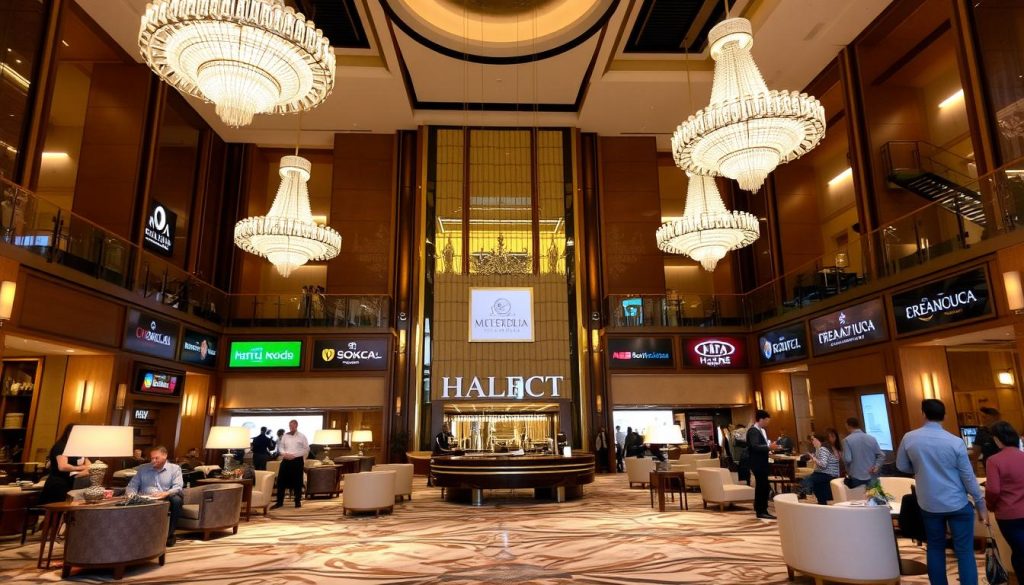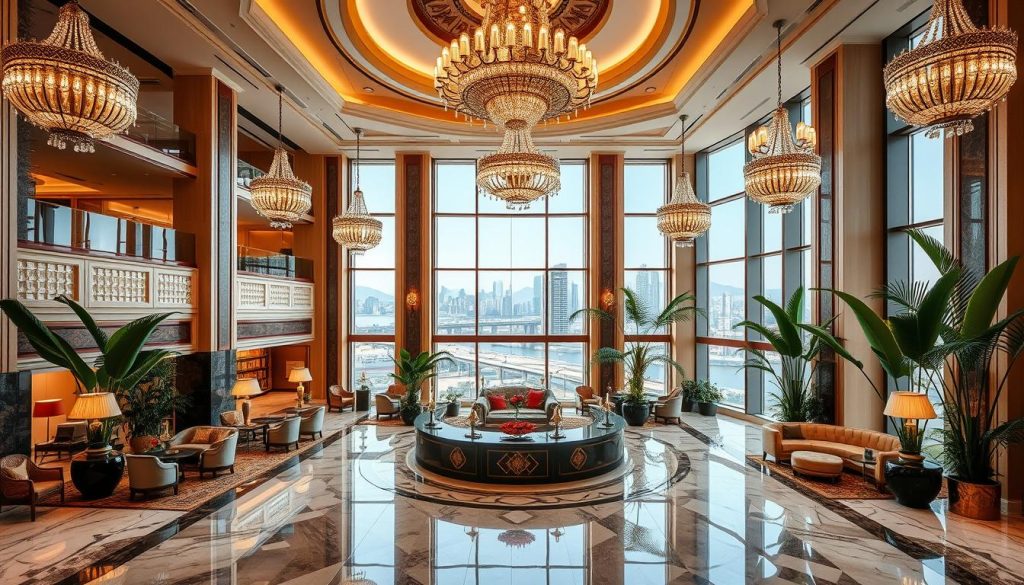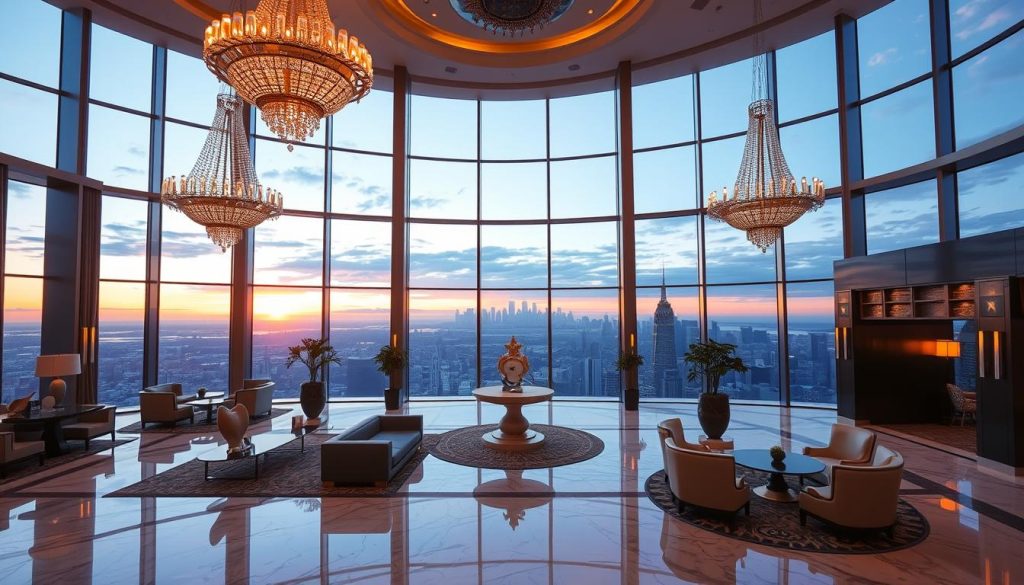Do you love the sparkle of the hotel world? Dreaming of a job that takes you from cozy boutique hotels to towering skyscrapers? With over 700,000 hotels worldwide, the industry is full of chances for those eager to succeed1. This guide will show you the best hotel chains and groups. It gives you important facts and stats to help you find where you might work or study.
The luxury hotel market is set to grow by 6 percent each year until 2025, outpacing other hotel types2. People often pick hotels because of good past experiences and the promise of a special stay2. Knowing about luxury hotel chains can really help as you look into your career options.
Key Takeaways
- The luxury hotel segment is expected to grow rapidly in the coming years.
- Positive past experiences and the promise of a premium experience are key drivers for consumers when choosing a hotel brand.
- The hotel industry is vast, with over 700,000 establishments worldwide, offering diverse career opportunities.
- Leading hotel groups like Marriott, Hilton, and Accor operate thousands of properties across the globe.
- Renowned luxury brands like Four Seasons, Mandarin Oriental, and Aman are known for their exceptional guest experiences.
The Evolution of Hotel Brands and Chains
The hotel industry has changed a lot in the last few decades. It used to be full of independent hotels. Now, chains and brands lead the way, giving travelers a consistent experience3.
What are Hotel Chains?
Hotel chains are groups of hotels under one brand. They make sure guests know what to expect, with the same quality and services everywhere3. Big names like Marriott International, Hyatt Hotels Corporation, and InterContinental Hotels Group are well-known3.
Consolidation in the Hotel Industry
The hotel industry has seen a lot of consolidation. Mergers and acquisitions have made a few big companies stand out4. This has changed the game, letting these chains grow bigger and improve their services4.
For example, Marriott bought Starwood Hotels & Resorts, and Accor got Fairmont, Raffles, and Swissôtel5. These deals made huge hotel companies with lots of brands for different travelers5.
As hotels keep changing, chains and brands will play an even bigger role. They promise a reliable experience wherever you go3.
Understanding Hotel Brand Business Models
The hotel industry has many business models. Mega-chains use franchise and management agreements to grow fast6. Franchising is common, letting big names like Marriott and Hilton expand without a lot of money6. Management contracts let hotel owners use a brand’s name and systems, but the brand controls some parts of the hotel.
Franchising vs. Management Agreements
Franchising lets hotel owners use a brand’s name and systems for a fee6. This way, the chain grows fast without owning the hotels6. Management agreements have the brand run the hotel for the owner, earning a share of the profits7. Owners get the brand’s help and know-how, but the brand keeps control over how the hotel looks and feels.
| Hotel Business Model | Key Characteristics |
|---|---|
| Franchising | – Makes up over 67% of chain hotels in the U.S6. – Gives brand recognition and how-to guides – Owners pay fees for the brand’s name and help – Helps chains grow fast without needing a lot of money |
| Management Agreements | – Makes about 2-7% of total income for operators6 – Owners hire branded groups to run their hotels – Brands set the guest experience and hotel standards – Owners get help with running the hotel |
There are more ways to run hotels, like owning them yourself or leasing them7. Each has its own level of control, risks, and costs. Choosing a model depends on the owner’s experience, how much risk they can take, and their goals.

Types of Luxury Hotel Chains
Luxury hotel chains offer a wide range of experiences for travelers. They have everything from full-service hotels with many amenities to boutique and lifestyle hotels with unique designs and personal service8.
Full-Service Hotel Chains
Full-service hotels are known for their many facilities and services. They have restaurants, pools, event spaces, and lots of activities for both work and fun trips9. The Ritz-Carlton and Four Seasons are top names with over 100 hotels worldwide9. Four Seasons even offers a private jet service9.
Boutique and Lifestyle Hotel Chains
Boutique and lifestyle hotels are a special choice. They focus on design, personal service, and giving guests a unique experience. Aman and Belmond are leaders with over 30 and 40 properties globally9.
These hotels offer a close and deep experience, focusing on design, local culture, and top-notch service. Mandarin Oriental and Six Senses are known for their luxury and are in over 20 locations9.

Whether you like the wide range of full-service hotels or the unique feel of boutique and lifestyle hotels, there’s a lot to choose from. The luxury hotel world can make your trip special8.
| Hotel Chain | Number of Properties | Key Offerings |
|---|---|---|
| The Ritz-Carlton | Over 100 hotels and resorts worldwide | Full-service luxury experiences |
| Four Seasons | Over 100 hotels, resorts, and residences globally, including private jet service | Full-service luxury experiences |
| Aman | Over 30 hotels, resorts, and residences globally | Boutique and lifestyle luxury experiences |
| Belmond | Over 40 hotels, luxury trains, and riverboats across the globe | Boutique and lifestyle luxury experiences |
| Mandarin Oriental | More than 30 hotels, resorts, and residences known for high service standards | Boutique and lifestyle luxury experiences |
| Six Senses | Presence in over 20 hotels, resorts, and residences, mostly in exotic locations | Boutique and lifestyle luxury experiences |
Top Luxury Hotel Chains
The luxury hotel industry is led by giants like Four Seasons, Ritz-Carlton, Mandarin Oriental, and others. These chains cater to different needs with their diverse brands11.
Aman is famous for its simple design and focus on the environment. Mandarin Oriental is known for its top-notch service and style. Oetker Collection is celebrated for its European luxury and unique experiences11.
Four Seasons is known for its excellent service and facilities. It appeals to those who love luxury, whether in cities or resorts11. St. Regis is famous for its elegance and the St. Regis Butler Service. Six Senses focuses on sustainability and wellness, offering a holistic experience11.
Oberoi is known for its outstanding service and attention to detail. Pan Pacific offers stunning views and prime locations. Belmond sets its hotels in historical buildings, immersing guests in local culture11.
Banyan Tree Hotels & Resorts is all about environmental care and rejuvenation. Guests can enjoy eco-friendly stays in beautiful natural settings11.
Booking a stay at a top luxury hotel means getting consistent quality, great service, and comfort12. There are many choices for those looking for upscale stays12.
Experts help pick the nominees for the 10Best Readers’ Choice Awards. Readers can vote once a day for their favorites12. Travel writers share tips and stories about luxury hotels and travel12.
USA TODAY 10Best offers travel tips and highlights top spots around the world12.
Park Hyatt balances luxury with loyalty rewards, offering perks like suite upgrades and breakfast13. Waldorf Astoria gives special perks to its members, making it easy to earn status with credit cards13.
St. Regis offers luxury with perks for Platinum members, like free breakfast and suite upgrades13. Alila focuses on nature but has varying quality, offering perks through the Hyatt Privé program13.
EDITION by Marriott aims to be a youthful version of Ritz-Carlton, offering perks to Bonvoy elite members13. Ritz-Carlton has varying standards, suggesting booking through Marriott STARS for the best experience13.
Four Seasons is known for its consistent top service and no hidden fees. Booking through the Four Seasons Preferred Partner program gets you perks like free breakfast13. Rosewood is growing fast and competes with Four Seasons, offering perks through the Rosewood Elite program13.
Mandarin Oriental is known for its strong city hotel experiences and is growing well13.
Navigating Loyalty Programs and Rewards
Major hotel chains have launched hotel loyalty programs that let guests earn points for free nights and upgrades. These programs are key to keeping guests coming back and help hotels understand what customers like. This makes their services better suited to guests’ needs14.
Understanding hotel rewards programs can be tricky, but the perks are worth it for those who travel often. For example, Accor Live Limitless gives 5 to 25 points for every 10 euros spent, and you can use these points to get rewards14. Best Western Rewards lets you earn 10 points for every U.S. dollar spent, and you can get a free night starting at just 5,000 points14.
Other big hotels like Choice, Hilton, IHG, and Marriott also have loyalty programs. They offer different ways to earn and use points, fitting various guests’ needs and travel habits14.
But, some guests prefer getting immediate rewards over waiting for points. There’s also a debate on whether these programs really build loyalty or just focus on transactions1516.
Hotels need to find the right balance in their loyalty programs. They should think about their brand, who they want to attract, and the competition16. Some luxury brands choose to stay exclusive and don’t offer discounts, keeping their value high16.
The success of hotel loyalty programs depends on offering real value and a personalized experience. Hotels need to understand what their guests want to create programs that truly make a difference1516.
Luxury Hotel Chains and Sustainability
Luxury hotel chains are now focusing on being more sustainable. They’re cutting down on carbon emissions by using green energy, saving water, and buying local, organic food17. These hotels aim to be both fancy and kind to the planet17.
https://tunekong.com/hardscaping-ideas-that-will-make-your-backyard-the-talk-of-the-neighborhood-14/
They work hard on being energy-efficient, reducing waste, and saving water17. Many use solar power and encourage guests to travel green by offering bike rentals and electric shuttles17. Staying at these places helps protect nature and supports local communities17.
These hotels focus on organic food and wellness programs for a healthier stay17. They’re cutting down their carbon footprint with smart design and waste management17. You can find different types of sustainable luxury hotels, like eco-resorts and eco-friendly hotels17.
Most travelers are willing to pay more for hotels that are good for the planet18. The search for “sustainable hotels” has been rising over the past five years18. This shows more people want to stay in eco-friendly places when they travel.
Some luxury hotel brands are setting the standard for being green. For example, all 1 Hotel locations are LEED or BREEAM certified, and they’re working to be carbon-neutral18. Six Senses gives a lot of its profits to sustainability efforts18. Banyan Tree supports projects that protect nature and local cultures18.
These hotels are priced like luxury but focus on being sustainable. For instance, Six Senses Ibiza is a top-rated green resort starting at $1,050 a night18. Banyan Tree also shares its sustainability progress in an annual report18.
The luxury hotel industry is changing for the better. By choosing eco-friendly ways, they’re not just helping the planet. They’re also attracting guests who care about the environment171819.
Even individual luxury hotels are making big strides in being green. Ojai Valley Inn got a top award for being eco-friendly19. The Dolder Grand in Zurich uses only hydropower and is CO2-neutral19. Bucuti & Tara Beach Resort in Aruba is very energy-efficient19.
Other hotels are also doing great things. Drake Bay Getaway Resort in Costa Rica is carbon-neutral and uses renewable energy19. The Brando in French Polynesia cuts energy use by 45% with a smart AC system19. Atlantis, The Palm in Dubai is trying to stop using single-use plastics and cut waste by 95%19. Amilla Maldives is working to eliminate plastic water bottles and uses solar power for some energy19.
These examples show how luxury hotels are really focusing on being sustainable. They’re making a big effort to lessen their environmental impact and offer guests a greener experience171819.
Conclusion
The luxury hotel industry has changed a lot, with big hotel companies and changing traveler tastes leading the way. Understanding this changing market means knowing about different business models and trends in luxury hotels20.
Luxury hotels started in the late 1700s and have gotten better over time. Now, big names like Accor, Marriott, and Hilton lead the change20. These companies offer luxury not just in hotels and resorts, but also in cruise lines and airlines20.
In 2021, the luxury industry hit a record high of €1.15 trillion in sales, with growth expected to be 19%-21% in 202221. People want more personal and meaningful experiences. Luxury brands are offering more tailored services and mixing products and services to create unforgettable moments21. But, it’s hard for them to keep things exclusive while meeting the demand21.
FAQ
Are you fascinated by the glitz and glamour of the hotel industry?
Yes, the hotel sector is full of opportunities for those who are ambitious in hospitality. With over 18 million guest rooms worldwide, it’s a vibrant field.
What is a hotel chain?
A hotel chain is made up of many properties under one brand. For guests, this means they know what to expect in terms of amenities and service.
Do hotel chains directly own and operate the majority of properties?
Actually, big hotel chains often use franchise and management contracts to grow. This way, they don’t need much money to start new hotels. Franchising helps giants like Marriott, Hilton, and Hyatt grow fast.
What are the main classifications of chain hotels?
Branded hotels are mainly classified into full-service, select service, boutique, resort, and extended stay chains.
Who are the leading luxury hotel chains?
Top luxury hotel chains include Four Seasons, Ritz-Carlton, Mandarin Oriental, Aman Resorts, Belmond, Rocco Forte Hotels, Oetker Collection, Como Hotels and Resorts, and Dorchester Collection.
How do hotel loyalty programs work?
Hotel loyalty programs let guests earn and use points for free nights, room upgrades, and more. These programs help hotels keep guests coming back and learn what they like.
How are luxury hotel chains addressing sustainability?
Luxury hotel brands are working to be more eco-friendly. They use renewable energy, save water, and choose local, organic food. Some are even designing new hotels with sustainability in mind.

